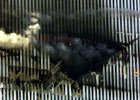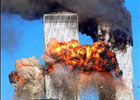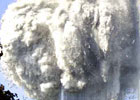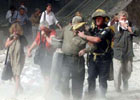Backgrounder: 9/11 attacks
 0 Comment(s)
0 Comment(s) Print
Print E-mail
Xinhua/Wikipedia, September 6, 2011
E-mail
Xinhua/Wikipedia, September 6, 2011
9/11 attacks were a series of four coordinated suicide attacks against the United States on September 11, 2001.
|
|
|
|
|
|
|
|
|
|
|
|
|
|
|
|
|
|
|
|
The string of attacks killed some 3,000 people, and caused a loss of hundreds of billions of U.S. dollars.
Suspicion quickly fell on al-Qaeda, the Islamist militant group. In 2004, Al-Qaeda leader Osama bin Laden, who initially denied involvement, claimed responsibility for the attacks.
Al-Qaeda and bin Laden cited U.S. support of Israel, the presence of U.S. troops in Saudi Arabia, and sanctions against Iraq as motives for the attacks.
In response, the U.S. launched the War on Terror and many other countries strengthened their anti-terrorism legislation and expanded law enforcement powers.
On Oct. 7, 2001, the U.S. military launched an anti-terror war in Afghanistan, where bin Laden was believed to hide. Within two months, U.S. troops toppled the Taliban regime in Afghanistan.
Afterwards, the U.S. government dispatched more forces to the volatile country to hunt down bin Laden, but to no avail.
On March 20, 2003, the U.S. government launched the Iraq War, as it accused Iraq of owning weapons of mass destruction and colluding with bin Laden.
Although the Saddam regime was overthrown, the U.S. pretext for launching the war turned out to be baseless.
The nine-year-long anti-terror war hasn't brought real security to the United States. On the contrary, homegrown terror suspects frequently appear in the United States, and impose a continuous threat.
Al-Qaeda, a sore point for the United States, seems to have grown stronger instead of being eliminated.
Moreover, the U.S. anti-terror wars in Iraq and Afghanistan not only caused huge civilian casualties and political turbulence in the two countries, but cost the United States itself dearly as well.
So far, more than 1,220 U.S. service personnel have lost their lives in Afghanistan. However, that is far short of the 4,400 who have died in Iraq.
The cost of U.S. military operations in Iraq was about 748 billion dollars, and spending related to the war in Afghanistan reached 300 billion dollars.
After taking office, U.S. President Barack Obama began to adjust the country's anti-terror strategy. On May 27, the president released his first National Security Strategy report.
The new strategy unveiled by Obama is more multilateral than that of the Bush administration, but its ultimate purpose is still to safeguard America's interests, secure its lead position in the world and seek absolute security with the backing of its absolute superiority.
It was not until May 2011 that bin Laden was found and killed.






















Go to Forum >>0 Comment(s)